One Health AMR Research Data Platform
Project background
The crisis of antimicrobial resistance (AMR) is well documented, with increasing pressure to reduce antimicrobial use (AMU) in agriculture. Currently there is no reliable source of information to estimate AMU or to understand how, when and what antibiotics are used in livestock farming. It is therefore difficult to know if antibiotic reductions are having the desired effect of reducing AMR in both animal and human populations while maintaining animal welfare, environmental sustainability and food security.
Linking AMU to AMR data in the same animal/herd/farm is crucial to support the investigation of critical questions regarding AMR selection, transmission and impact on health and food security, as well as to inform practice and impact on regulation and reporting. However, this ‘record linkage’ is not currently possible as datasets are held by different parties. In order to surpass this, we are spearheading an initiative to assess the benefits of linking major sources of AMU and AMR data currently collected by the UK livestock industry.
This project draws together information from many different sources such as veterinary records, milk retailer data, findings from research studies and diagnostic laboratory results into one research database. This resource will allow researchers to investigate the actual use of antimicrobials and the effect of changes in use or other factors on AMR while working with Bristol’s ALSPAC team to translate state-of-the-art technology to maintain strict confidentiality, anonymity and data protection.
 Together, this resource will provide a framework in which future policy and education can be developed, mitigating the risk of AMR.
Together, this resource will provide a framework in which future policy and education can be developed, mitigating the risk of AMR.
